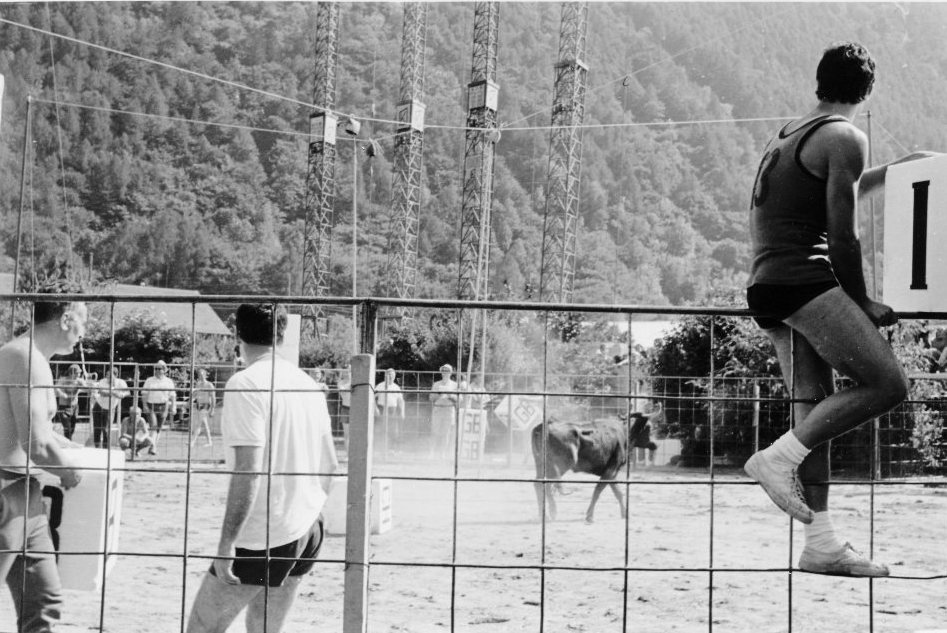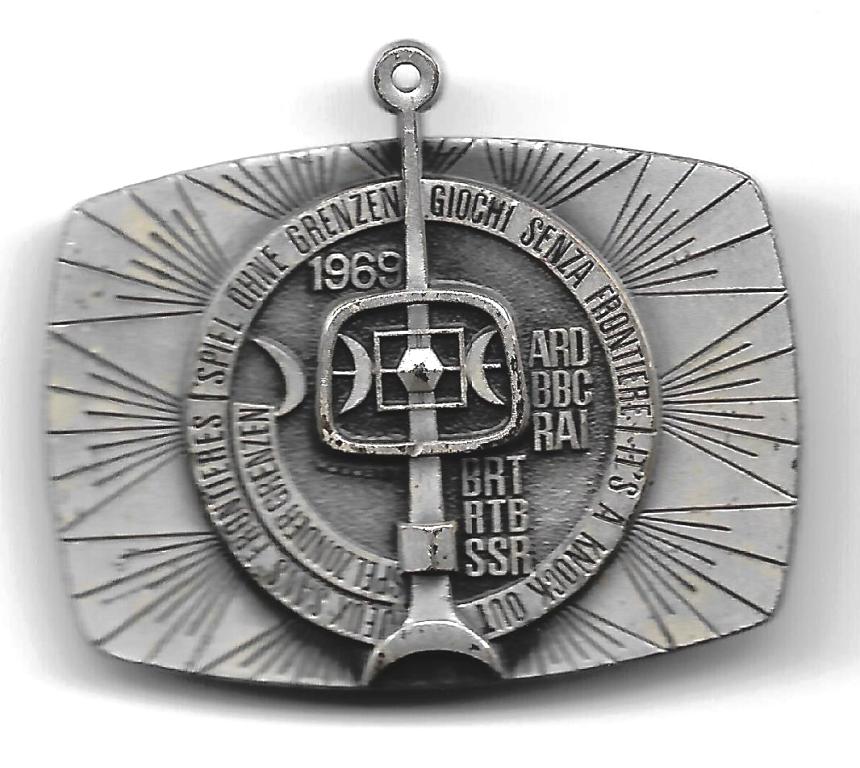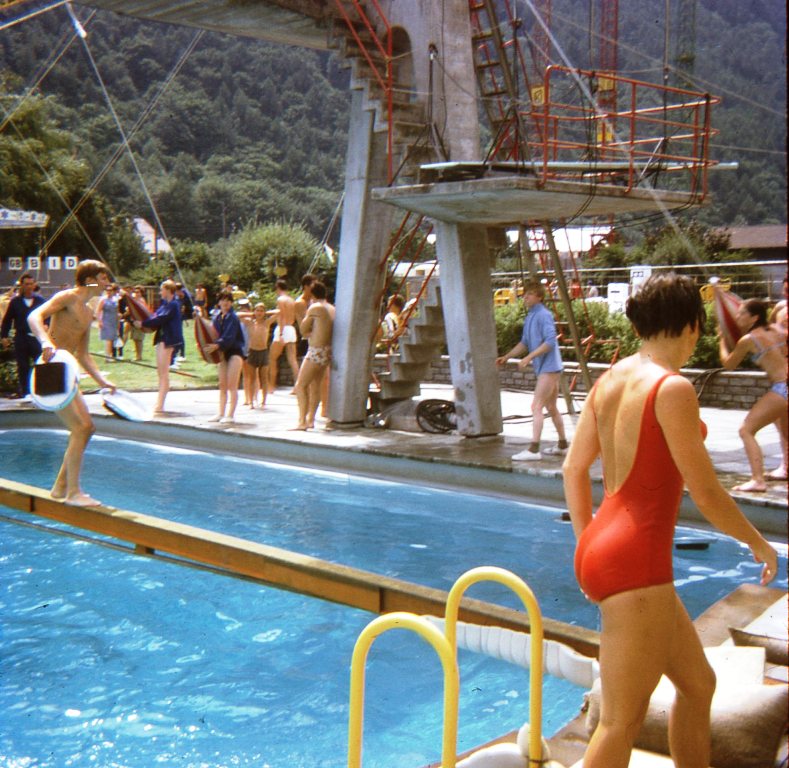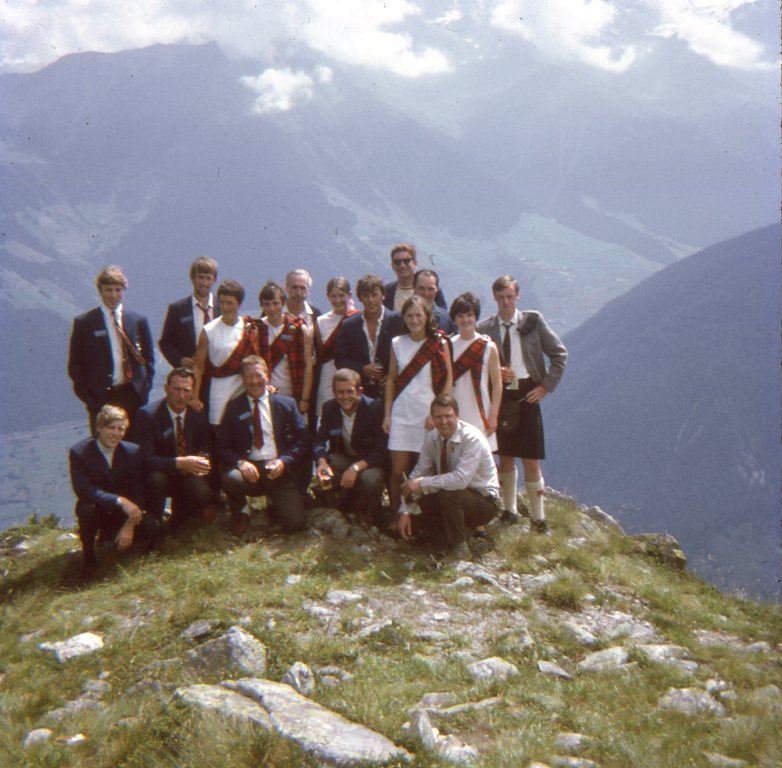This month, we return to 1969 and the follow up to It’s A Knockout which took place in Dunbar Swimming Pool/Pond in June of that year. Because Dunbar won that contest against Burntisland, they qualified as one of the British teams and they represented GB at the event in Martigny (good photos) in Switzerland. Photographs relating to the event were given to DDHS by Douglas Robertson and Rob Bisset, and Jim Herring conducted interviews with some of the Dunbar team.
The badge above was given to all participants who went to Martigny in 1969. The teams involved in the event were Halle (Belgium), Martigny (Switzerland), Minden an der Weser (Germany), Dunbar, and Foggia (Italy). There is a full description of all the games here (scroll down to Heat 4) although the names of the Dunbar team are not all correct. The event took place on Wednesday 6th August 1969 and was broadcast on TV on BBC1 on Friday 8th August from 9.05pm to 10.20pm. As with the It’s A Knockout in Dunbar, there is no recording of the event, as the tapes were wiped and re-used. The team flew to Switzerland and for many of the team, including the cheer girls, this was their first ever flight and added to the excitement of the trip. Douglas Robertson remembered “After the flight, we had two bus journeys to get to Martigny. The scenery from the airport to Martigny was very new to us and the mountains were quite spectacular”. You can see the glorious setting of Martigny here (good photos).
The photo above shows Alistair Lister practising for his participation in the Feeding Time game. While Alistair walked along the beam, team mates at the side of the pool – see enlarged photo – launched sacks to try to dislodge him. The game is described as ” ‘Feeding Time at the Zoo’ – was the Jeu Intermédiaire which was played over 2 minutes 30 seconds duration underneath the diving board of the main pool and was the second game to include live animals. It featured three male competitors dressed as zookeepers armed with two trays each bearing a fish. On the whistle, each of the competitors had to take it turn to walk across a narrow beam spanning the pool. Once across to the other side, the fish had to be handed to a stagehand who would then feed the fish to five penguins in a small fenced pool. In opposition on the pool’s edge, there were four opposing females (one from each of the other teams) each armed with a sack hanging from above and they had to use the sack to dislodge the competitors from the beam as they crossed and thus plunging them into the water. The team with the greater number of fish carried across the pool would be declared the winners”. In this game, real penguins were used and they were in a small pool.
The first game in which Dunbar participated was called The Spanish Bull and it also featured a live animal. However, while the penguins were safely ensconced in their pool, in this game, the bull was in the ring with the competitors! Douglas Robertson took part in the game, along with Dick James and Jaci Waite. Douglas Robertson remembered “We had to carry polystyrene blocks from one side of the ring to the other. To make sure you went across the middle, you had to ring a bell. It sounds very easy, but there was a bull in the ring! You had to encourage the bull to knock down the opposition’s pile of blocks. It wasn’t a friendly bull at all and I had a wee contretemps with the bull. It got me up against the fence, with a horn on either side of me and it started butting me against the fence. Dick James came to my rescue and got hold of the bull’s tail and pulled it away. When I climbed on to the fence, I looked down and there was poor Dick under the bull’s feet! He managed to get away and climb the fence. This was the last competition when they had live animals in Jeux Sans Frontiéres“. So, a very dramatic experience for Douglas and Dick and it was fortunate that both of them had experience in working with animals on farms around Dunbar.
If you enlarge the photo above, you will see the Dunbar team on a trip up one of the mountains near Martigny and the dramatic scenery behind the team. Douglas Robertson recalled “We went on a bus trip into the mountains before the games. We then got a ski lift to the top of the mountain and there was a café at the top. We were surrounded by mountains and of course, this being Switzerland, the mountains were much, much higher than any of us had seen before – and certainly not in Scotland. The views across the mountains were tremendous”. The Dunbar team finished fourth out of the five teams on the night. It is estimated that 8 million watched the BBC transmission on Friday 8 August. There were 4 other TV broadcasts – live in Belgium, Switzerland and Germany – and shown on the Friday night in Italy, so the Dunbar team may have been watched in total by 40 million people.




You must be logged in to post a comment.